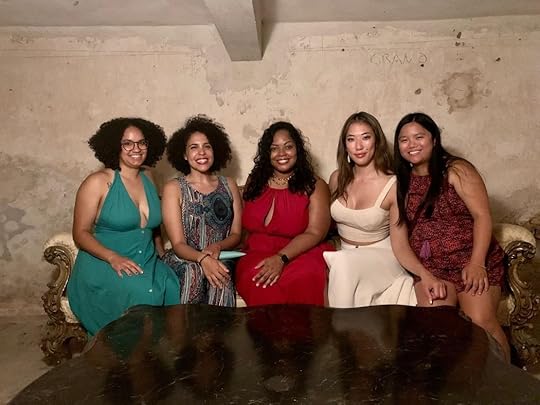Marisa G. Franco's Blog, page 3
September 27, 2023
One-Sided Friendships: To Give Up or Give Grace?

My Instagram poll on your most common friendship struggles revealed that issues with reciprocity hover at the top. For advice on navigating these issues, I want to tell you about my driver, Ted.
On the road to a speaking event, I started chatting with Ted. He mentioned that his wife died last year from cancer, and that he didn’t know where he’d be if he didn’t have friends. His 70th birthday was approaching and he was having trouble keeping the guest list under 40, much to his son’s upset. In other words, Ted was a friendly guy.
Knowing the research on how older men tend to struggle with loneliness, I asked Ted what his secret was. “Don’t keep score,” he said, “be willing to be the one who reaches out. They’re happy to hear from you, even if they never reach out themselves.” In other words, give up on reciprocity.
While I appreciated Ted’s advice, I knew it wouldn’t work for me. For my closest friends, I require reciprocity. If the reciprocity isn’t there, we can be friends, but we won’t be close. But I also don’t think anything was wrong with Ted’s approach.
Sometimes relationship advice is too one-size-fits-all, ignoring the heterogeneity in how different people experience the same events. For example, one study found that when anxiously attached people viewed a threatening face, their amygdala—the part of their brain associated with negative emotions and stress—was triggered more intensely. When people with low self-esteem faced potential rejection, another study found, they released more cortisol (a stress hormone) than people with high self-esteem.
Some of us, like Ted, may be perfectly at peace in a one-sided friendship. Others, however, may be pumping with cortisol, or teaming with stress at the thought of it. No one should endure friendships that make them feel chronically lousy, even if those same friendships make others feel fine. We need to know ourselves, our needs, and our boundaries to make the right call for us (I realize this is an ironic thing to say from someone who has given a lot of advice on friendship).
So next time you’re in a one-sided friendship, I’d like you to ask yourself do I have the capacity to give grace? By that, I mean can you be at peace in a one-sided friendship, or does it trigger resentment, stress, and feelings of unworthiness in you? If it’s the latter, you have your answer.
The post One-Sided Friendships: To Give Up or Give Grace? appeared first on Dr. Marisa G. Franco.
July 27, 2023
What to Do With Your New Friend

I must confess something to you–I don’t like cornhole.
I try and I try to launch that fat sack into that tiny hole, and the sack launches every which way. Hitting the board is a win for me, forget about the hole. Sometimes we should believe in our ability to grow at the things we work hard at, but other times, it’s just hopelessness. That’s me and cornhole. Our relationship is doomed.
But, in recently attending a cornhole league, I recognized why it can be a powerful way to foster connection. When conversation peters, and things get awkward, you have the sack to focus on. There’s less squirming, less social anxiety. And maybe when we meet new acquaintances, some of us need a sack in our lives: something novel to focus on so we can avoid the existential anxieties of being laid bare with each other.
One study sought to test the claim that when we have unusual and exciting experiences with new acquaintances, we’ll feel closer to them than when we do something ordinary.
Here’s what it found:
People were told to recall either an extraordinary or ordinary experience with a recent acquaintance. After recalling the extraordinary experience, they reported feeling more similar to the acquaintance. People met a new acquaintance in the lab, and were given a wafer. Half were asked to do unusual things with the wafer (put a wafer under your nose and smell it) and half were asked to do ordinary things (put a wafer in your mouth to taste it). The pairs that did unusual things reported feeling closer after. People imagined buying light bulbs (ordinary) or christmas lights (extraordinary) with a new acquaintance. They reported feeling closer to the new acquaintance after imagining the christmas bulb shopping. This study also examined why. It turns out shopping for christmas bulbs was more absorbing, alleviating the awkwardness of an initial encounter.So what kinds of extraordinary experiences could you do with a new friend? It should be absorbing, giving you and your new friend something to talk about and focus on, if needed:
Go for dessert. Researchers found that “risky eating”, indulging in high-calorie foods like a milkshake, is linked to more feelings of closeness.Try an unusual workout together. See if there are any puppy or even goat yoga classes happening in your area. Even if you’re a proficient yogi, adding in these lovable animals is sure to make for an unusual experience.Check out your local zoo. Walking around and seeing all the animals gives you a lot to focus on. It also gives you a lot to talk about to keep the conversation flowing if that’s needed.The post What to Do With Your New Friend appeared first on Dr. Marisa G. Franco.
June 22, 2023
In Support of the Platonic Getaway

“We’re not meant to live the way we are.”
Countless times, this thought emerged on my platonic getaway. What is a platonic getaway? A romantic getaway with friends. To celebrate the success of Platonic, I rented a villa in Mexico for a month and invited friends to rotate in any time they wanted.
“We’re not meant to live the way we are,” I thought as a Mexican friend canceled on me last minute and my friends Rabia and Zaria brought me roses. What might have taken a day or so to emotionally shake off took hours. Friends regulate our tough emotions, I knew. But living with friends forced me to communicate these emotions, to be upfront about my distress, a distress I’d typically see as too trivial to expend friends’ resources on.
“We’re not meant to live the way we are,” I thought as I received an accusatory text from a family member on my birthday, only to then hear a knock on my door. It was my friend Kana, gifting me a wooden guest book inscribed with “Platonic Love, Too” on the cover. I teared up, feeling seen and cared for in ways that dislodged the negative residue of that text.
“We’re not meant to live the way we are,” I thought as I listened to nearly every friend who rotated into the trip describe themselves as “restored” or “renewed” upon departing.

A platonic getaway is an anomaly in the ways we live. But the way we live is an anomaly of how we’ve always lived. What is necessary for us to thrive—connection—is treated as superfluous. Sociologist Émile Durkheim calls this “anomie,” a disjuncture between the norms of society and what people need to thrive.
Our culture compels us to venerate work as if it’s salvation—the one true path to happiness and fulfillment. Of course, most of us focus on work because we have to rather than because we want to. But when it comes to work, we are taught we should want to, that work is the most justifiable pursuit in life.
And yet, work success doesn’t make us happy. Psychologists coined the term “arrival fallacy” to mark our misguided assumption that when we “arrive” at meeting our goals, we’ll be endlessly happy. It’s only connection (particularly high-quality connection) that stabilizes our mental health.
In a society where up to half of us are lonely and more than one in five of us lives with mental illness, we can’t trust society to tell us the right way to live.
As for me, I’m refraining from using the success of Platonic as fodder to further worship the false prophet of work. Instead, I’m channeling the resources that coincide with its success into living the life I truly want. Platonic getaways and all.
Here are some ideas for how you can creatively pump more connection into your life:
If you work from home, plan a weekly co-working date with a friend.
Find “time affluence” with friends through a trip or sleepover.
Experiment with hanging out with friends even when you don’t feel up to it. Note how you feel after. An introverted friend of mine said when it comes to social opportunities, instead of asking himself “do I want to go?,” he asks himself “will I be glad I went?”
Track your day for the time when you feel most lonely (when you wake up? Before bed?). Commit to spending those moments sending a text, voice note, or phone call to a friend.
Experiment with being an hour less productive a week and plan to spend that time, instead, with a friend. Note how you feel.
The post In Support of the Platonic Getaway appeared first on Dr. Marisa G. Franco.
May 25, 2023
The Science of Conflict

Conflict.
AHHHHHHHHHHHHH.
I still feel scared of it sometimes, because a part of me still sees conflict as combat, but since writing Platonic, I see it with more nuance. Here are some things I’ve learned from studying the science of conflict:
Conflict can give us skills. For kids, conflict with friends can be particularly beneficial. While conflict with parents is top-down, conflict with friends requires negotiation and compromise, which explains why, for them, conflict is linked to better problem solving skills. Good conflict starts before conflict happens. One study on adolescents found that in good quality friendships, conflict only became linked to negative outcomes (such as delinquency or withdrawal) when it became frequent. For people in low quality friendships, any conflict was linked to negative outcomes. This study suggests that we set the stage for healthy conflict all the time. Investing positively in our friendships–by being loving toward our friends, reliable, or generous–provides a foundation for healthier conflict when it arises. It’s not conflict that hurts our friendships; it’s how we have it. Conflict, in its self, isn’t a bad thing. One study, for example, found that when a betrayal occurred, confronting the perpetrator in an open non-blaming way deepened the relationship. People who are good at conflict (e.g., by listening, admitting fault, de-escalating, and taking the other person’s perspective), another study found, were more popular, and less depressed and lonely.
Since writing Platonic, I’ve come to embrace some additional practices of healthy conflict:
Ask questions: One sign of healthy conflict is mutual perspective taking. Your friend’s actions may have meant something to you and something different to them. Healthy conflict is reconciliation and involves each party holding their point of view alongside the other person’s. Ask your friend: “What’s your perspective? Where were you coming from?” Embrace vulnerability: Often, we attack when a vulnerable part of us has been triggered–a part that feels unworthy, alone, or shameful. We might want to say our friend is bad, unacceptable, or intentionally cruel to escape these vulnerable feelings via blame. Instead, if we can acknowledge our vulnerability, conflict can bring us closer by allowing us to understand each other and build empathy. Next time you have a conflict, ask yourself “what vulnerable part of me did this trigger?” and ask yourself if you can share that vulnerability: “I feel hurt when you make decisions for both of us, because it reminds me [insert instance] where I’ve felt powerless. Embrace ambivalence: Ambivalence allows us to harness multiple truths: that even when a friend hurt us, we still love them and they still love us. When we embrace ambivalence, we acknowledge that an instance of conflict doesn’t unsettle the love we’ve built, that even if we’re feeling negatively, we can also feel positively toward our friend. In practice, it looks like: “I was hurt by that comment, even though I know you love me and wouldn’t go out of your way to hurt me.” As my friend Kana shared “just because we’re in conflict doesn’t mean we can’t be kind to each other.”For more tips on healthy conflict, check out Platonic.
The post The Science of Conflict appeared first on Dr. Marisa G. Franco.
April 27, 2023
Why You Should Talk To Strangers

When I lived in New York City and felt lonely, I’d look around and see tables of friends and wonder how they found their people. I wanted to make friends, but it felt taboo to admit this, and intimidating to try. If I tried to converse with someone, would they ignore me? Judge me as strange? Get annoyed?
You probably know this about me by now, but I often turn to research as a way to soothe my fears. Like a reassuring friend, studies often tell me that the scary thing I think might happen probably won’t. And even if it does, I’ll survive.
One such study is called “Talking to strangers: A week-long intervention reduces psychological barriers to social connection.”
For a week, participants in this social experiment were asked to either observe a stranger who matched a description (e.g., wears shoes you like) or strike up a conversation with them. Those who were repeatedly asked to talk to strangers, rather than just observe them, at the end of the week felt more positive, less awkward and more confident in their ability to talk to strangers, and expected to enjoy conversations with strangers more. Even more, they still felt this way one week later.
The study also found that people predicted strangers would be open to talking to them 40% of the time. The reality? 87% of the time strangers were open to talking to them.
What does this mean for friendship? It means opportunities to make new friends are all around us. The study found that 41% of people who had to talk to strangers exchanged contact information to follow up. Initiating conversations with strangers can be intimidating but if we can move past that first moment, we’ll find out that it’s not as intimidating as we think and more rewarding than we imagine.
So here’s what I suggest if you’re looking for friends, strike up conversation with someone:
Commuting with youSitting at your coffee shopServing you food or drinksWaiting in line beside youTaking an exercise class with youAttends your social group (book club, running club, language class, etc.)The science tells us it’s not as scary as we think.
The post Why You Should Talk To Strangers appeared first on Dr. Marisa G. Franco.
December 30, 2022
New Year’s Resolutions to Make Friends

New Year’s Resolutions to make friends:
I got new glasses in 2019 right around New Years and sported them in a New Year’s Eve Facebook post with the caption, “I guess you could say I’m looking forward to 20-20.”
I can admit when I’m wrong.
So I’m going into 2023 with no expectations, ready for whatever it wants to show me. And I’m also ready to support those of you who want 2023 to bring you more connection.
So here are some science-backed resolutions to make more friends in 2023:
1. Reconnect with an old friend.One study found that when we reconnect with people, they appreciate it more than we assume. Scroll through your phone contacts and find someone you wish you never fell out of touch with. Send them a text saying you were just thinking about (XYZ memory) and you wondered how they were. If they seem interested, ask them to hang out.
2. Ask your friend to put you in touch with someone you might get along with.We tend to be less lonely when our friends are friends with one another, one study finds. Making friends with your friend’s friends is a sustainable way to connect because then any one of you can reach out and maintain relationships for all of you.
3. Repot a relationship to make it a friendship.“Repotting,” according to Ryan Hubbard, founder of the Kitestring Project, means varying the settings in which you interact. The more we repot a friendship, according to one study, the deeper the friendship. Repotting looks like asking a neighbor, or colleague, who you’ve been wanting to get to know better, to go for a walk or join you for tea.
4. Join something repeated over time.One study involved planting strangers in a large lecture course for varying numbers of classes. At the end of the semester, students in the class were asked who they liked best among the strangers. It turns out they preferred the stranger who showed up for the most classes. This was true even though the students didn’t remember any of the strangers AND didn’t interact with any of them during the class. This phenomenon is called the mere exposure effect: our tendency to like people once they become familiar (and for them to like us!).
Research a group that meets regularly around a hobby or interest of yours (hiking? board games? sports? alumni groups? language classes?; Meetup is a good place to start). Commit to showing up for 2-3 months, so mere exposure sets in, and friendships can sprout.
5. Remember everyone else is looking for friends, just like you.Sometimes, there are wonderful friend options around, but we discount them because we think “they already have friends,” or “I don’t want to seem lonely.” One study found we overestimate how socially connected others are, and it makes us feel like we don’t belong (though it can also motivate us to try to make friends).
This is the energy I’d recommend for you for 2023: So many people want to be my friend; they’re just waiting for me to ask.
As you put yourself out there to make friends in 2023, I’m rooting for you!
Want more? My NYT bestselling book Platonic: How the Science of Attachment Can Help You Make-and Keep-Friends and my website offer more insights on making friends.
The post New Year’s Resolutions to Make Friends appeared first on Dr. Marisa G. Franco.
October 28, 2022
The Deeper Reason You May Not Like Anyone
 The Deeper Reason You May Not Like Anyone
The Deeper Reason You May Not Like AnyoneNo one can be trusted.
No new friends.
I don’t like people.
One question I grappled with while writing my book Platonic is: If we are an inherently social species, why are some of us so antisocial? What is the deeper reason we may not like anyone?
It’s hard to like people when we don’t feel valued by themOne reason is that we struggle to feel valued by others. But why would that impact how much we like people? According to the theory of inferred attraction, people like people who they think like them. When strangers interacted, one study found that how much one liked the other depended on how liked they felt in the interaction. If we like people when we think they like us, then when we assume no one likes us, we won’t like anyone.
The deeper reason you may not like anyone: It’s hard to like people when we don’t feel valued by them. In fact, one study found that feeling valued is the number-one thing people look for in friends. Similarly, avoidantly attached people—who isolate themselves because they tend to think other people can’t be trusted and don’t have their best interests in mind—report experiencing less joy in interactions. When we feel rejected, we self-protect—withdrawing, getting aggressive, acting critically, disliking—ultimately making us cynical toward others.
But if we don’t like people, it may not be because no one is safe, but rather, because of past trauma, we struggle to absorb that anyone could be safe. Past trauma leads us to scan for current threats that crudely mimic it. A frown, a perceived slight, or even a tone can poke at this trauma, leading us to react as if the original wound had reoccurred. With unhealed trauma, it may feel like we are only safe around perfect people, lest we superimpose our perpetrator onto them. And because no one is perfect, no one is safe. And because no one is safe, we don’t like anyone.
The Path ForwardH.E.A.LOur past wounds impel us to scan for signals of threats and ignore those of safety. Thus, to feel safe around others and like them more, we must scan for signs of safety.
Rick Hanson, a psychologist who studies neuroplasticity, created the H.E.A.L. model to help people rewire their brains to feel safer and happier. It involves, essentially, attending to and savoring moments of safety that our threat-saturated brain would typically ignore. Hanson argues that what is state becomes trait, or, in other words, the more we scan for safety, the more our brain will do so automatically.
To practice H.E.A.L., intentionally attend to what’s safe. Don’t let good moments pass by without focusing on them. Here are the first three steps of H.E.A.L. (the last is optional, so I’ll review only the first three).
Have a beneficial experience. Signals of safety don’t have to be substantial, like someone driving you to the hospital after you broke your arm. They can be tiny—someone smiled at you, held the door, validated your feelings, flashed you kind eyes, texted you to check in, congratulated you, or even liked your social media post. Notice these experiences.Enhance the experience by doing things like pausing to savor the joy of it or upping the intensity of the positive feeling. Soften and open to its positivity. Let it stir something in you.Absorb the positive experience by picturing it melting into your body.Why does H.E.A.L work?There is research suggesting that H.E.A.L. rewires the brain. When an experience is intensified, our body releases more norepinephrine, which makes our brain more malleable and makes us more likely to remember things. Another review indicates that the more rewarding an experience is (such as when we savor it), the more our bodies release dopamine, which alters our brain structure and fosters new memories. Hanson’s research found that people who practiced H.E.A.L. felt more positively and less negatively for months after employing the model.
If someone smiles, savor the warmth it ignites, and visualize yourself installing the warmth in your body. If a friend initiates plans, focus on their care until it stirs positive emotions in you; picture yourself absorbing that care. The next time you are hugged, stop to imbibe the love in their embrace, feel its glow in your heart, and visualize that glow growing in you. Don’t let any signal of safety go unnoticed.
H.E.A.L. will require intention and practice before feelings of safety happen automatically. But the more you do it, the safer you’ll feel. You’ll eventually feel safe enough to relinquish your walls and to like, and possibly even love, people.
For more on the science of healing our relationships, you can read my book Platonic: How the Science of Attachment Can Help You Make—and Keep—Friends.
The post The Deeper Reason You May Not Like Anyone appeared first on Dr. Marisa G. Franco.
For Healthy Romance, You Need Friends

For Healthy Romance, You Need Friends
I grew up hearing messages like “find one person to complete you” and “someday, you will find the one.” Romantic love mattered most and other forms of love, especially platonic, were disposable. I shared in my book, Platonic, research that called this love hierarchy into question. Assuming one person sufficiently completes us, I found, leads us to lose out on not just friendship but also romance.
Why can’t one person complete us?There are three types of loneliness, only one of which a spouse can fulfill. We experience intimate (desire for most intimate relationships, like a spouse or best friend), relational (desire for good friends), and collective (desire for a larger community) loneliness distinctly. Because of this, we can be lonely even with the a spouse. We, truly, need an entire community to feel whole.
The functional specificity model is a clunky term for the idea that each type of relationship offers something different. Thus, no one relationship can fulfill all our needs. Its authors state, “relationships tend to become relatively specialized in the needs for which they provide, and as a result, individuals require a number of different relationships for well-being.” This idea is backed by a study on emotionships, which finds that we experience higher well-being when we turn to different people to help us work through different emotions. Other research finds people who rely on various people for support (spouse, child, friend) experience better quality of life.
Why are friends important to healthy romance?We need to feel connected to function; when we’re disconnected, according to research, it hinders our sleep and mental and physical health. If we only rely on a spouse for connection, then the health of that relationship disproportionately determines our health. Normal ups and downs in that relationship, then, can be devastating. For example, one study found that people enduring marital conflict released stress hormones in a maladaptive pattern unless they had quality connections outside the marriage.
According to the substitution hypothesis, when we feel disconnected in one relationship, we naturally maintain belonging by seeking to connect in another. According to researchers, “feelings of connectedness in other relationships can compensate for fluctuations in feelings of connectedness with one’s romantic partner.”
Having friends can make us resilient to marital stress because our other relationships help us maintain homeostasis. When we are resilient to strife with our spouse, this not only benefits us but also our spouse. Spouses’ mental health is intertwined, given research that when one person’s happiness changes, their spouse’s tends to as well. If friends make our spouses happy, their happiness will benefit us. Supporting this, the more people interacted with friends, one study found, the less depressed not only they were, but also their spouses.
The post For Healthy Romance, You Need Friends appeared first on Dr. Marisa G. Franco.
The Power of Validation

The Power of Validation
In my book, Platonic: How the Science of Attachment Can Help You Make—and Keep—Friends, I spend an entire chapter reviewing the importance of friendship. The longest-running study on happiness, for example, found that connection is the most significant predictor of our happiness and longevity.
But other research finds that the benefits of connection depend on not the presence of a relationship but on the quality of it. Our memory declines earlier when we can’t count on the close people in our life. Research on ambivalent friends (the ones we have mixed feelings about) finds that discussing something bad with them increases our heart rate, and so does simply having them. Another study found that the more ambivalent friends women had, the shorter their telomeres: an indicator of the body’s premature aging.
These studies suggest that it’s not just any old friend we should welcome into our lives. It’s the right kind of friend. What should we look for to find them?
One key factor is: They’re validating.
What is validation?According to renowned psychologist Marsha Linehan, validation means communicating to someone that “her [or his] responses make sense and are understandable within her [or his] current life context or situation.” Linehan argues that what makes us emotionally dysregulated adults is experiencing little validation as a child.
Some people may be reluctant to validate someone they think is wrong. But according to Linehan’s definition, validation isn’t agreeing. It’s legitimizing. It’s signaling: it is OK that you feel that way, given all you’ve been through—not that what they’re saying is right.
The Power of ValidationIn parallel to findings related to ambivalent ties, invalidating ties hurt us physically and mentally. In one study, people completed a nearly impossible math test in the lab. Afterward, they shared their feelings with an experimenter. The experimenter responded with something validating (e.g., “lots of people have said that they felt that way”) or invalidating (e.g., “I’m not sure why you are stressed”). Invalidated people felt worse and had a higher heart rate. They also felt less safe in the interaction and were more disengaged—showing less eye contact, frowning more, and smiling less.
In contrast, validation heals us and makes us stronger. People who had to hold a bucket at arm’s length were better able to keep doing it when they received validation from a research assistant (e.g., “It is painful isn’t it?”) rather than invalidation (e.g., “I didn’t feel anything like that when I did it”). For the validated, the task took less of a toll on their mood. Another study found that when people were validated after sharing feelings about being excluded in the lab, they reported higher self-esteem and less aggression and negative mood.
If we can become more validating friends, according to this research, we’ll make our friends feel safer, happier, and better about themselves. Not only that, but they’ll also be more engaged with and less aggressive toward us. That’s why it’ll benefit us and our friends if we can learn to be more validating.
How to ValidateTo be more validating, first pause and absorb your friend’s experience. Think about what their experience must be like for them, given what you know of their history and personality. This will allow your validation to be genuine and not hollow.
Then, you can offer any of the following validating statements:
It makes sense that you feel that way.I think your feelings are valid hereYour views are understandableI get what you’re sayingTo validate and disagree: I get why you see it that way. Here’s what I would add based on my view of the situation.The post The Power of Validation appeared first on Dr. Marisa G. Franco.
How to Make Friends as an Adult

You just moved to a new city. All your friends are getting married or having kids. You retired. You got divorced. You’ve outgrown your childhood friends. You’ve been clinging to your spouse as your only friend and it’s making you lonely. There are many reasons why you might need to make new friends—and if you don’t need to make them now, you will at some point. Here, I’ll share some of the secrets in a step-by-step guide to how to make friends as an adult.
Assume People Like YouSomething surprising I learned while studying the science of friendship is that people who fear rejection the most are (unknowingly) most rejecting of others. Why?
Research finds that people who assume they’ll be rejected (when circumstances are ambiguous—like when someone is quieter than usual) tend to withdraw and become cold, ultimately pushing others away and willing the rejection they fear.
When researchers, however, told people they’d be accepted when entering a group (even when this wasn’t true), they shared more, disagreed less, and were more positive—ultimately making the premonition come true.
Danu Anthony Stinson, a psychology professor at the University of Waterloo, and her colleagues remarked that “if people expect acceptance, they will behave warmly, which in turn will lead other people to accept them; if they expect rejection, they will behave coldly, which will lead to less acceptance.”
So the more you assume people like you, the friendlier you’ll be, and the more they actually will. And I promise you won’t be deluded by assuming this. According to research on the liking gap, when strangers interacted, they later underestimated how liked they are by one another. This underestimation is even more pronounced for self-critical people. So assuming people like you might bring you closer to the truth.
Don’t Wait for Friendships to Happen OrganicallyI met a woman who was remarkably friendly and asked her how she became that way. She told me her mother always told her “everybody wants to be your friend; they’re just waiting for you to initiate.” It’s true. You may think everyone already has their friends, but research shows we’re lonelier than ever before.
So many of us are waiting for someone else to initiate with us, but according to one study, when people viewed friendship as happening without effort, they were lonelier years later. When they viewed friendship as taking effort, they were less lonely.
Pursue a Hobby in a GroupRebecca G. Adams, a sociologist, remarked that friendships happen organically when we have repeated unplanned interactions and shared vulnerability. Unfortunately, as adults, we rarely experience these ingredients like we did as kids—playing at recess and schmoozing at lunch. Sure, we see our colleagues day after day, but workplaces aren’t known for fostering vulnerability.
As adults, we have to recreate this infrastructure. We can do so by pursuing our favorite hobby in a community. You can join a hiking, running, or improv group, a book club, a language or meditation class, or a kickball league.
Overcome Covert and Overt AvoidanceSo you picked your group. You’re doing great! I once thought showing up was all it took, but as they say in the infomercials: wait, there’s more.
If you’ve shown up, you’ve overcome overt avoidance: when we stay home because we’re too afraid. Now you must overcome covert avoidance, which occurs when we show up physically but check out mentally.
Covert avoidance manifests as diddling on your phone or chatting with the one person you already know. To overcome it, you must introduce yourself to others, “Hey. My name is_______. How long have you been coming to this [event]? How do you like it?”
I know: that sounds scary. But remember—assume they like you and it won’t be.
Keep Showing UpSo, you showed up to the group once and it was… awkward. You may be ready to run home, immerse yourself in reality television, and decide watching someone heave their cocktail at an unsuspecting victim has become more important than making friends. Such is life.
But, before you do, you should know about the mere exposure effect, which describes our unconscious tendency to like people more when they are familiar to us. In one study, researchers had women show up at a psychology lecture for a varying number of classes: 0, 5, 10, or 15. At the end of the semester, students didn’t recognize any of the women. But they liked the woman most who showed up to the most classes; she was liked 20 percent more than the woman who didn’t show up to any.
According to the mere exposure effect, interactions are inherently awkward at first. We’re weary of each other. There’s no trust built. We can’t really be sure someone won’t pour their martini all over us. Forgive me. I watch too much reality television.
But over time, people in the group will like us more and we’ll like them more. Even if (according to the study) we don’t even say anything to them. So keep showing up, and keep introducing yourself. It’ll pay off.
Generate ExclusivityOne vital feature of friendship is exclusivity: You have experiences with one person that you don’t have with others. Find someone in your group to start generating exclusivity with by asking them to meet up before or after next week’s group. Your unique shared experience will sprout early buds of connection.
Exclusivity also fosters friendship because it “repots” the connection. Ryan Hubbard, the founder of the Kitestring project, developed this term to describe how we can deepen friendship by varying the settings in which we interact. For example, your work friend becomes your real friend when you hang out at happy hour. Studies link repotting to deepening intimacy.
Show People How Much You Like ThemWhen I mention the importance of telling people you like them to make friends, people gawk. Maybe it’s clingy? Maybe it’s coming on too strong? But, maybe it’s exactly what all of us lonely and insecure souls need to hear.
One study found the number one feature people look for in a friend is someone who likes and values them. According to the theory of inferred attraction, people like people who they think like them. When strangers interacted, one study found, how much one liked the other depended on how liked they presumed they were. When researchers followed budding friendship pairs for months, do you know which pairs endured? Those in which people expressed affection for one another.
So practice revealing to people that you like them. You can tell them how happy you are to hear from them, compliment them, greet them warmly, or share what you like about them or when something they said resonated.
So go out there, find a group, assume they like you, show them you like them, make the ask (“let’s hang out next week before running club?”), and make the friends you’ve been waiting for.
This content was adapted from my book Platonic: How the Science of Attachment Can Help You Make and Keep Friends.
The post How to Make Friends as an Adult appeared first on Dr. Marisa G. Franco.



